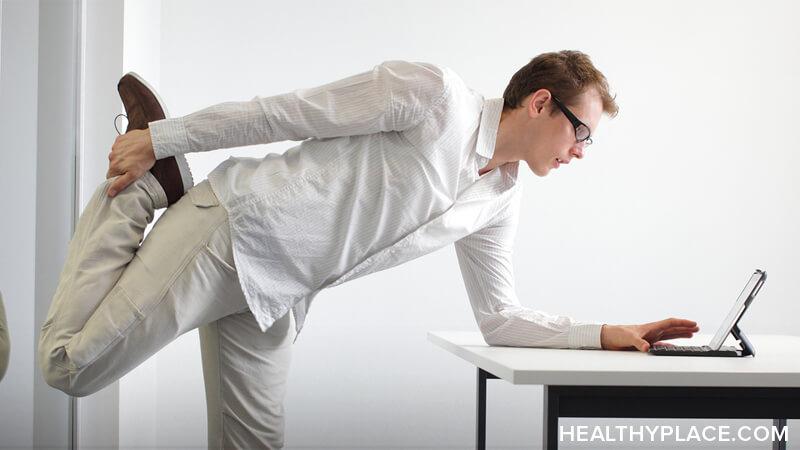How to Ease the Anxiety in Your Body Now and Forever

Anxiety hangs out in the body as much as it does in the mind. Many of the symptoms of anxiety are physical because we are one whole, united system: brain, body, and mind. Because of this, our entire being--thoughts, emotions, and body--is impacted by stress and anxiety. As annoying and life-disruptive as this is, it means that we have multiple ways to find it and heal it. You can reduce your symptoms by working with your body. Here are some ways you can ease the anxiety in your body both immediately and long-term.
The Anxiety in Your Body Talks to You, So Be Sure to Listen
One of the best ways to nurture and heal the anxiety in your body is to begin to listen to your body. Our bodies talk to us. The aches, pains, and other symptoms we feel are the body's way of asking us for help. We are usually aware of unpleasant physical sensations, but we often don't stop to fully experience them. (And why would we want to do that? They're uncomfortable at best and can be debilitating at worst, so why would we purposefully be mindful of them?)
As much as you might not want to attend to your unpleasant bodily symptoms, developing the habit of periodically pausing to tune into yourself deeply and giving your body your complete, mindful attention will help you better understand how stress and anxiety impact you. Your body tells you where and how it hurts so you can nurture it right where you feel stress and anxiety.
Do this in a couple of ways:
- Notice when you don't feel well. On the surface, this is easy. We notice physical problems. What isn't always easy is staying with the discomfort. If you have a headache, stop and pay attention to it. If it's digestive troubles, tune in. Allow yourself to experience your symptoms rather than pushing them away. This is a form of self-compassion and understanding that helps you be kind to yourself and know where to take care of yourself.
- Check in regularly with your body, even when you are symptom-free. Self-check-ins allow you to learn about your body and how it responds to the ups and downs of life. When you feel well, appreciate it and let yourself enjoy it. Consider what you're doing so you can replicate it. Doing more of what works helps reduce anxiety symptoms.
In addition to checking in and listening to your body, you can do things to ease the physical symptoms of anxiety when they happen and keep them at bay long-term.
Do These Things for Immediate Relief from Anxiety in Your Body
Whether it's a headache, stomachache or other digestive troubles, joint and/or muscle pain, or other pain and discomfort, try these strategies to reduce stress and ease your anxiety symptoms when they occur:
- Take several slow, deep breaths to calm your body's stress response.
- Stretch the muscles of your body (doing a few tai chi sequences or yoga poses can be very beneficial, but any deliberate stretches work).
- Use progressive muscle relaxation, tensing one muscle group at a time, holding, and releasing (making sure to pay attention to your body as you go).
- Have a bite to eat, preferably something bland that will soothe rather than further agitate your stomach.
- Drink a glass of water (many of anxiety's physical symptoms are also signs of mild dehydration).
- Place a heating pad on your belly.
- Use an ice pack on your neck, shoulders, or other joints.
- Take a warm bath to ease muscle tension.
Get Long-Term Symptom Relief for Anxiety in Your Body
You can achieve long-term relief for anxiety in your body when you nurture yourself daily. Being intentional about what you eat and do will reduce physical symptoms and can provide the nourishment your brain and body need to handle stress.
- Eat healthy foods and avoid processed fast foods and junk foods (see "List of Foods that Help and Hurt Anxiety").
- Exercise or simply take breaks throughout your day to move your body in ways you enjoy.
- Sleep (okay, this one's often hard with anxiety so at least develop a sleep routine with a regular bedtime and time to get out of bed, calming rituals to encourage falling asleep, and a plan for what to do when anxiety wakes you up).
- Consider massage therapy.
Physical symptoms of anxiety are your body's way of asking you for help. Listen to what your body is telling you, and then do specific things to ease your symptoms. You can feel better right away and for your life.
What do you do to relieve anxiety in your body? Do you have problems with this? Share your thoughts in the comments.
APA Reference
Peterson, T.
(2020, May 14). How to Ease the Anxiety in Your Body Now and Forever, HealthyPlace. Retrieved
on 2026, February 2 from https://www.healthyplace.com/blogs/anxiety-schmanxiety/2020/5/how-to-ease-the-anxiety-in-your-body-now-and-forever
Author: Tanya J. Peterson, MS, NCC, DAIS
One thing I have noticed lately is that when my anxiety is high my eyesight suffers. I am wondering if I am alone in this? It's like i cant focus my eyes periodically. They feel inflamed almost. It's like I am crossing my eyes, but I'm not. I can correct it but it does this off and on frequently during a day when my anxiety is up.
Hi Drew,
Anxiety can affect every part of the body, including eyes/eyesight. You're not alone -- my own vision is impacted by anxiety, too (objects can be somewhat blurred/less clear, and focusing is more difficult). As with any physical symptom, it's always a good idea to check in with a doctor (in this case, an optometrist or ophthalmologist) just to rule out underlying causes that aren't related to anxiety.